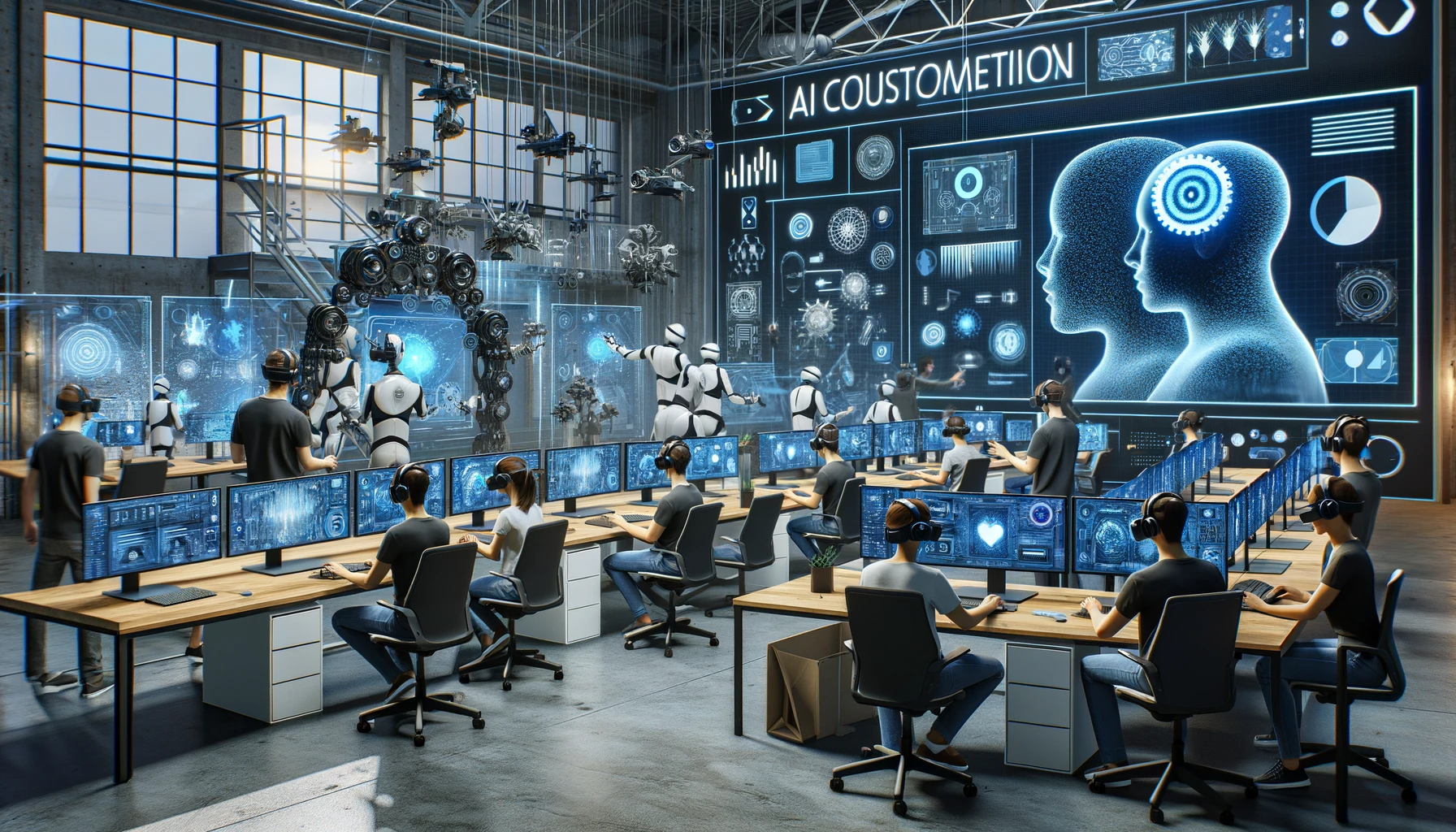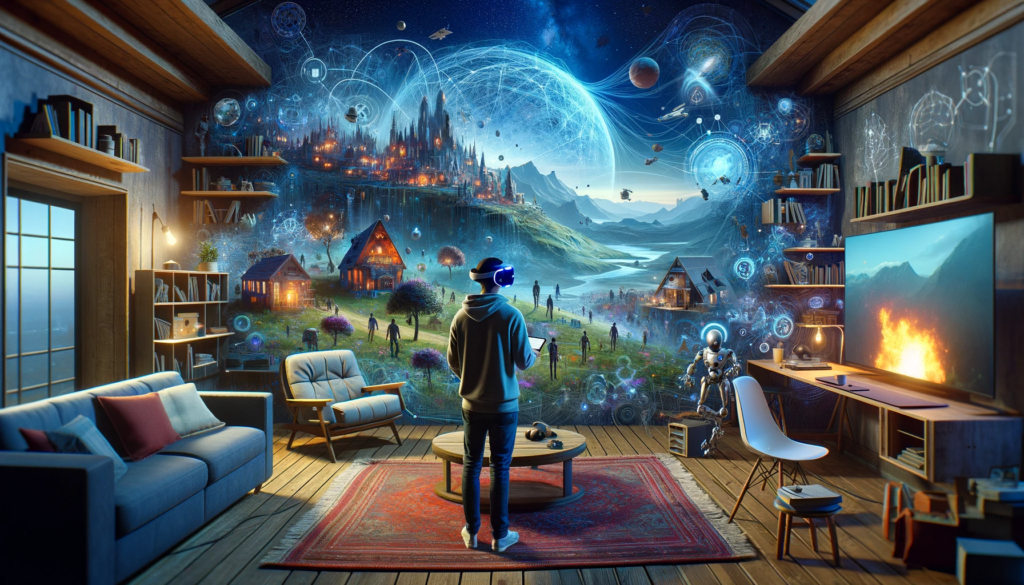Virtual Reality (VR) technology has rapidly evolved, making it an integral part of various industries, from gaming and entertainment to healthcare and education. In recent years, the synergy between VR and Artificial Intelligence (AI) has sparked remarkable advancements, particularly in the realm of personalized experiences. This article delves into the transformative role of AI in shaping the future of personalized VR experiences.
The immersive nature of VR has made it a compelling medium for diverse applications, allowing users to explore new worlds, simulate real-life scenarios, and engage with content in ways never before possible. However, the mass appeal of VR hinges on its ability to deliver personalized, meaningful experiences that cater to individual preferences and needs.
The Current State of VR
As of today, VR technology has reached a level of sophistication that was once the stuff of science fiction. VR headsets are widely accessible, and an array of applications has emerged across industries. In the gaming world, VR offers unparalleled immersion, enabling players to step into virtual worlds and interact with them. In the medical field, VR is used for simulations and therapy, providing realistic training and treatment options. In education, VR enhances learning by making complex concepts tangible.
Yet, despite its immense potential, VR has its limitations. It often struggles to maintain a sense of realism, and user experiences can vary significantly. Users with different preferences, comfort levels, and physical capabilities may find VR experiences either captivating or disorienting. This is where AI enters the picture, promising to address these challenges by personalizing VR content and interactions.

The Role of AI in Personalization
AI plays a pivotal role in making VR more personalized and engaging. At its core, AI relies on data-driven insights and algorithms to understand user behavior, preferences, and needs. In the context of VR, this translates to creating tailor-made experiences that cater to individual users.
Machine learning, computer vision, and natural language processing are some of the key AI techniques that contribute to personalization in VR. Machine learning models analyze user data, such as movement patterns and interaction history, to predict and adapt to user behavior. Computer vision enables VR systems to track users’ gestures and facial expressions, allowing for more natural and intuitive interactions. Natural language processing empowers VR systems to understand and respond to verbal commands and dialogues, enhancing communication within virtual environments.
The result of AI-driven personalization in VR is a more intuitive, immersive, and enjoyable experience. Whether it’s a gaming adventure, a therapeutic session, or a training simulation, AI fine-tunes VR content and interactions to cater to the unique preferences and needs of each user.
By harnessing AI’s capabilities, VR is on the cusp of a new era—one where users can expect not only a higher degree of realism but also deeply personalized and engaging experiences. This article will delve further into how AI achieves this personalization and its potential across various industries and applications.
AI-Powered Personalization in VR Gaming
One of the most prominent areas where AI is reshaping the future of personalized VR experiences is gaming. AI algorithms are revolutionizing the gaming industry by enhancing immersion and personalization. Game developers use AI to create dynamic and responsive virtual worlds that adapt to the player’s actions and preferences. For instance, AI can adjust the difficulty level of a game in real-time, provide personalized in-game recommendations, and even create custom content tailored to the player’s interests.
Moreover, AI-driven character interactions in VR gaming have become more realistic and engaging. NPCs (non-playable characters) can now respond to players’ actions and dialogues using natural language processing, making the in-game interactions feel more authentic and personalized. These advancements not only enhance the gaming experience but also open doors to innovative storytelling and narrative-driven gameplay.
Personalized Healthcare and Therapy
In the realm of healthcare and therapy, AI-powered VR is making a significant impact. Virtual reality has long been used for therapeutic purposes, such as exposure therapy for phobias and PTSD treatment. AI adds a layer of personalization to these therapies, allowing healthcare professionals to tailor treatments based on patients’ progress and needs. AI algorithms analyze patients’ responses and adapt therapy sessions accordingly, ensuring that they are neither too overwhelming nor too easy.
Additionally, AI-driven virtual healthcare consultations are becoming more personalized and accessible. Patients can interact with virtual doctors and therapists, and AI analyzes their verbal and non-verbal cues to provide tailored advice and treatment plans. This not only improves access to healthcare but also ensures that patients receive personalized care that suits their unique conditions and preferences.
AI and Personalized Education in VR
The field of education is another domain where AI-powered VR is transforming personalized learning experiences. In virtual classrooms, AI algorithms track students’ interactions, learning styles, and progress. This data is then used to adapt the educational content and pace to suit individual students. For example, if a student excels in a particular subject, AI can provide advanced materials or tasks, while offering additional support to students who struggle with certain topics.
Furthermore, AI-enhanced virtual teachers and tutors are becoming more prevalent. These AI-driven entities can provide instant feedback, answer questions, and adapt their teaching methods based on the student’s learning style. This personalized approach not only improves comprehension but also makes learning more engaging and enjoyable.

Challenges and Ethical Considerations
Despite the promising advancements in AI-driven personalized VR experiences, there are challenges and ethical considerations to address. Privacy concerns arise as AI collects and analyzes user data to provide personalization. Striking a balance between customization and safeguarding user privacy is essential.
Additionally, there’s a risk of over-personalization, where AI algorithms may reinforce users’ existing preferences and limit exposure to new experiences. Striking a balance between catering to user preferences and introducing serendipity and diversity in VR content is a delicate challenge.
Moreover, there are ethical considerations surrounding the use of AI in healthcare and education. Ensuring that AI algorithms are unbiased, secure, and transparent is paramount to maintain trust and fairness in these applications.
In conclusion, AI is undeniably shaping the future of personalized VR experiences across gaming, healthcare, and education. As technology continues to advance, striking a balance between personalization, privacy, and ethical considerations will be crucial to harness the full potential of AI in the realm of VR.
